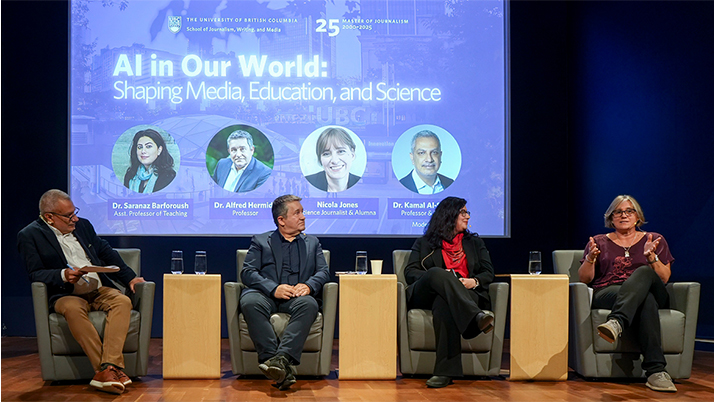UBC School of Journalism professor Duncan McCue is launching an exciting new online journalism education resource – Reporting in Indigenous Communities (www.riic.ca) – for journalists who cover Indigenous communities in Canada, the United States and around the world.
Designed for reporters by a reporter, RIIC offer useful ideas and practical methods for finding and developing news stories in Indigenous communities.
“The goal is to help journalists tell better Indigenous news stories,” explains McCue, creator and curator of the RIIC site. “The site offers real-world solutions to the many challenges journalists face when reporting in Indigenous communities.”
McCue is an award-winning network TV reporter for the CBC News The National, based in Vancouver. He’s a member of the Chippewas of Georgina Island First Nation in Ontario.
“Unfortunately, reporters aren’t immune to stereotypes about Aboriginal people that exist in the Canadian public; journalistic biases are well-documented,” says McCue. “We aim to change that, with an online education resource, free for any journalist, journalism student or newsroom to use.”
The RIIC site will serve as the “textbook” for the School’s ground-breaking Reporting in Indigenous Communities course, which starts in January 2012.
The RIIC site’s features include:
• Guide – the Guide is a reader-friendly examination of real-life issues reporters face in the field, everything from common news stereotypes of Aboriginal peoples to insights into Aboriginal customs and protocols;
• Teachings – a place for journalists to share lessons they’ve learned about reporting in Indigenous communities;
• Best Practices – the site uses social media tools such as Facebook and Twitter to create a crowd-sourced “best practices” guide of Indigenous news
The RIIC site is already winning praise from prominent Canadian journalists, broadcasters and educators:
This may be the most important addition to Canadian journalism in decades. With very few exceptions, Canadian journalists have little idea how to best pursue stories in the aboriginal community. Duncan McCue has proven to be one of those exceptions, and now he shares his inside knowledge with the rest of us. This will make us all better, but more importantly, it will make our stories much better.
– Peter Mansbridge, CBC News Chief Correspondent/Anchor – The National
Any viewer of television news in Canada knows Duncan McCue. He is a respected, fair and honourable First Nations citizen who proudly tells our stories, as well as many others, to Canadian audiences and probably others around the world. A lot of work has gone into this guide for reporters who either work, or wish to work, in our communities. I strongly recommend it as a must-read for all current and future reporters who want to report on this unique and intrinsic part of the Canadian story.
– Jean LaRose, CEO – Aboriginal Peoples’ Television Network (APTN)
The information in this website is reader-friendly, concise and illuminating; it provides practical guidance and advice when investigating, and framing an Aboriginal story. The information, herein, begs the critical question: why do we think the way we think – a question every journalist needs to consider when developing, writing and presenting a story. Thank you, Duncan McCue, for a sensitive examination of the issues and a clear, easy, (dare I say, enjoyable) to read, guide.
– Brenda Nadjiwan, Chair – Strategic Alliance of Broadcasters for Aboriginal Reflection (SABAR)
For more information about RIIC, contact Duncan McCue: dmccue@stanford.edu.


